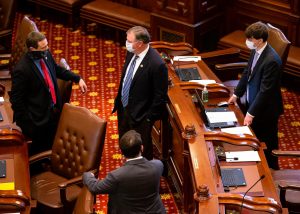Illinois Senate OKs graduated income tax language for November ballot
By Jerry Nowicki Capitol News Illinois — May 22, 2020
Senate Republican Leader Bill Brady, R-Bloomington, speaks with Sen. Neil Anderson, R-Andalusia, on the floor of the Senate during session Thursday at the Illinois State Capitol in Springfield. [Pool photograph by Justin L. Fowler/The State Journal-Register]
The Illinois Constitution Amendment Act requires the General Assembly to prepare a brief explanation of the proposed amendment, a brief argument in favor, a brief argument against, and the form in which the amendment will appear on the ballot in a pamphlet that will be distributed to voters.
That means each household with a registered voter will receive the information, which is contained in Senate Joint Resolution 1, by mail.
The arguments against were prepared by Republicans, and the arguments for by Democrats.
The arguments for the measure note the current tax system “unfairly benefits millionaires and billionaires;” voting yes on the amendment will enact a new tax structure where only those making more than $250,000 a year will see tax increases; and the amendment is “upgrading” Illinois’ tax system to one similar to the structure used by the federal government.
The arguments against say the measure “gives the Legislature power to increase taxes on any group of taxpayers with no limits and no accountability and without any requirement to use the additional revenue to fund essential needs.”
The other two points against are that “taxes and spending are out of control,” and, in the wake of the COVID-19 pandemic, this is “the worst possible time for a massive tax increase.”
The floor debate on the matter mirrored what voters will receive in pamphlet form.
Per agreed upon rules before the debate, the chamber limited arguments to three members of the Republican caucus. Sen. Jason Barickman, R-Bloomington, Sen. Dan McConchie, R-Hawthorne Woods, and Minority Leader Bill Brady, R-Bloomington, did the speaking.
Barickman argued the amendment was the equivalent of Democrats asking “just trust us” with another tax increase. He said many Illinoisans have “lost their trust in Illinois’ government,” and called the graduated tax “dangerous” for taxpayers who believe they’ve been overtaxed.
McConchie took issue with language that proponents are using about who can have taxes raised under such a graduated tax structure. He asked for a breakdown for how many small businesses and taxpayers would pay more, the same, or less under a proposed graduated rate structure that would take effect if voters approve the graduated tax amendment.
Senate President Don Harmon, D-Oak Park, who sponsored the measure, argued the vast majority of small business owners will see a tax reduction under the plan if they are pass-through entities such as S-corps or sole proprietors.

Sen. Dale Righter, R-Mattoon, takes a break at his desk between an executive committee and the Illinois Senate coming back into session Thursday at the Illinois State Capitol in Springfield. [Pool photograph by Justin L. Fowler/The State Journal-Register]
“The potential changes you have suggested are in fact possible today,” Harmon countered, noting a simple majority is all that is needed to raise the flat tax.
Brady said the measure was ill-placed, especially during the COVID-19 pandemic.
“Clearly there’s an argument between our two parties,” he said, noting the flat tax “is trustworthy and brings certainty to the people of Illinois.”
“Eliminating that provision in our Constitution brings into a lot of question about what the tax structure will look like,” he said.
Harmon thanked lawmakers for a “civil” debate on the issue, but argued the tax will be most beneficial to those “kicked in the teeth” by the COVID-19 pandemic.
He also argued no one is talking about changing the rates, and closed by saying 97 percent of Illinoisans will pay the same or less than they currently are in income taxes under the rate structure which has already been signed into law and will take effect on Jan. 1 if voters approve the measure.
The measure passed 36-19 before the chamber adjourned shortly before 9 p.m. Action is still needed in the House. Friday is scheduled to be the last day of the abbreviated session.
Per the measure, the text will appear on the ballot as follows:
The proposed amendment grants the State authority to impose higher income tax rates on higher income levels, which is how the federal government and a majority of other states do it. The amendment would remove the portion of the Revenue Article of the Illinois Constitution that is sometimes referred to as the “flat tax,” that requires all taxes on income to be at the same rate. The amendment does not itself change tax rates. It gives the State the ability to impose higher tax rates on those with higher income levels and lower income tax rates on those with middle or lower income levels. You are asked to decide whether the proposed amendment should become a part of the Illinois Constitution.
Ad 1 – 300×250 – Google ROS
Trending News
 Randall Road detour in effect ...Motorists traversing Randall Road through the Miller Road intersection in Carpentersville have ...
Randall Road detour in effect ...Motorists traversing Randall Road through the Miller Road intersection in Carpentersville have ... Two killed in Eden Expressway ...Two people were killed in accidents on the Edens Expressway. A three-unit ...
Two killed in Eden Expressway ...Two people were killed in accidents on the Edens Expressway. A three-unit ... Bloomington man killed in truck ...A Bloomington man died from injuries sustained Wednesday morning when his truck ...
Bloomington man killed in truck ...A Bloomington man died from injuries sustained Wednesday morning when his truck ... Vietnam Veterans Memorial replica wall ...“The Wall That Heals,” a three-quarter scale replica of the Vietnam Veterans ...
Vietnam Veterans Memorial replica wall ...“The Wall That Heals,” a three-quarter scale replica of the Vietnam Veterans ...
Ad 3 – 300×600 – Post Pages – Google ROS
Ad 2 – 300×250 – Google ROS



